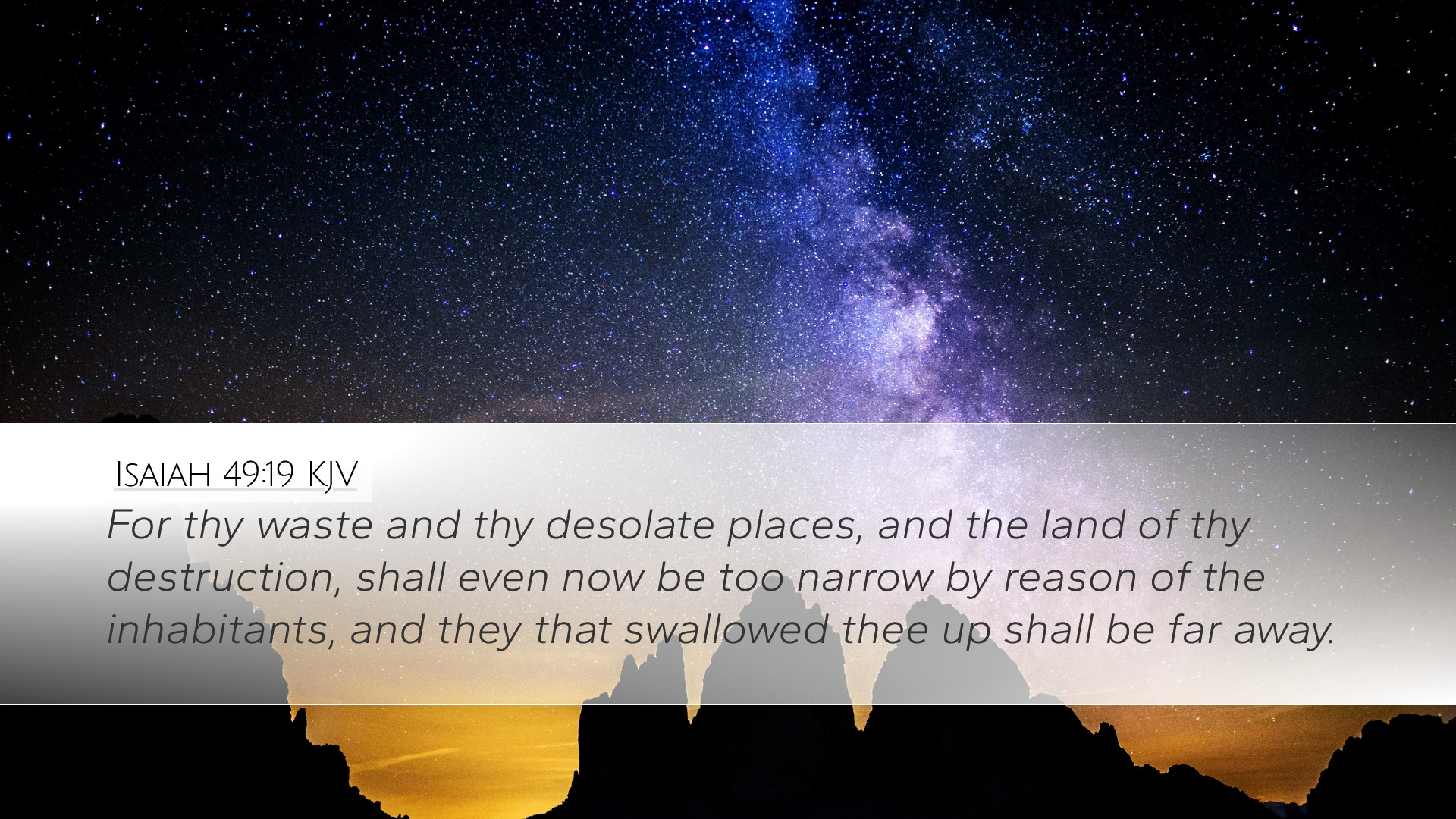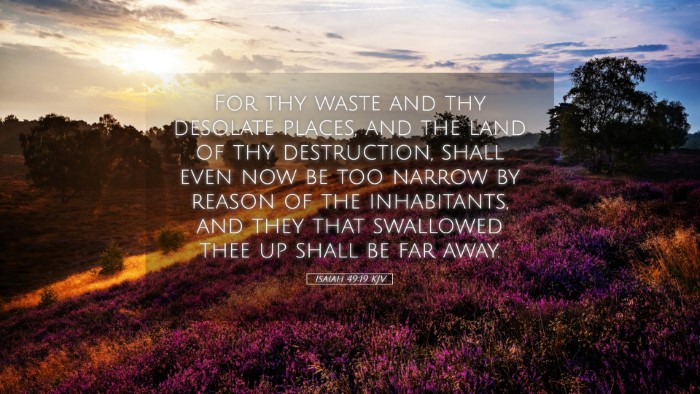Commentary on Isaiah 49:19
Isaiah 49:19 states, "For thy waste and thy desolate places, and the land of thy destruction, shall even now be too narrow by reason of the inhabitants, and they that swallowed thee up shall be far away." This verse encapsulates a profound promise of restoration amid adversity.
Contextual Background
This portion of Isaiah is set against the backdrop of Israel's captivity and desolation. As the Lord speaks through the prophet Isaiah, the focus is on the future hope of Israel as it faces apparent hopelessness. The imagery of "waste" and "desolate places" conveys the dire state of the nation.
Insights from Commentators
Matthew Henry's Commentary
Matthew Henry articulates that this verse emphasizes spiritual renewal and restoration. He notes that the desolation of Israel was not merely physical; it represented a spiritual barrenness as well. However, God's response is one of overwhelming grace. In the future, the restoration would be so profound that the growth of the inhabitants would exceed the capacity of the land — a vivid illustration of God's abundant mercy.
Albert Barnes' Notes
Albert Barnes focuses on the promise of a multitude returning to Zion. He argues that this verse symbolizes hope for those who feel isolated and forsaken. Barnes expounds on the metaphor of the land becoming "too narrow" as indicative of the transformative power of God’s promise. He suggests that the "inhabitants" represent the people of God who will return, implying an influx of believers after a time of spiritual famine.
Adam Clarke's Commentary
Adam Clarke provides a detailed examination of the figurative language present in this verse. He interprets the "waste" and "desolate places" as symbolic of both physical ruins and spiritual voids left by sin and disobedience. Clarke notes that the imagery of being "swallowed up" by enemies illustrates the oppressive nature of captivity, yet he emphasizes the assurance that those who oppress will be banished. God’s deliverance is portrayed not only as a physical restoration but as a profound spiritual revival.
Theological Implications
This verse invites us to reflect on the nature of God’s promises. It affirms that no matter the extent of one’s desolation—whether literal or metaphorical—God is capable of bring about restoration. The promise denotes not merely the return from exile but also a new life filled with vitality and purpose. Here are key themes:
- Divine Restoration: God promises to restore what has been lost, signifying His control over times of despair.
- Growth from Desolation: The transformation of desolate places into thriving communities symbolizes the miraculous work of God.
- Hope for the Oppressed: This promise extends beyond Israel; it serves as hope for all who face trials, suggesting an inclusive divine plan.
Application for Modern Believers
Isaiah 49:19 speaks powerfully to modern believers, whether they are dealing with personal trials, institutional struggles within the church, or societal desolation. The promise underscores that God is actively involved in the lives of His people, continually working towards their ultimate good and restoration. Here are ways it can be applied:
- Encouragement in Trials: Believers can take comfort knowing that their current struggles are not the end of the story.
- Faith in God's Provision: Just as God promised to fill the land with inhabitants, so too can believers trust in God's provision and care for their needs.
- Mission Orientation: Understanding our role in God’s plan for restoration can inspire action toward mission work, evangelism, and community outreach.
Conclusion
Isaiah 49:19 serves as a beacon of hope. Through the insights of respected theologians such as Matthew Henry, Albert Barnes, and Adam Clarke, we see the layers of meaning within this verse. It calls upon believers to embrace the promise of restoration, no matter how desolate the circumstances may appear. The assurance that God will fill the “narrow” places with inhabitants reminds us of the overflowing grace and abundance of life that God desires for each of us. As we meditate on this passage, may we find strength for today and hope for tomorrow.


